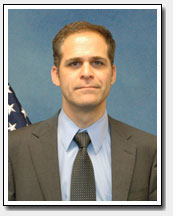By Ian Graham, Defense Media Activity

Washington, DC – The struggle of a wounded warrior, knocked unconscious in Iraq and awaking in Germany or the United States with serious injuries — in some cases amputations — can be hard to understand.
Retired Army Maj. Ed Pulido, a wounded warrior who faced serious bouts of depression and considered suicide while recovering from his injuries, joined a DoDLive Bloggers Roundtable to discuss issues he and other wounded warriors face, and the help he’s received from the Defense Department-sponsored Real Warriors Campaign.
[youtube]http://www.youtube.com/watch?v=ke9fwWSvvM0[/youtube]
The Real Warriors campaign uses video and multimedia projects to raise public awareness of veterans’ issues and help service members returning from deployment to reintegrate into civilian life.
Pulido said that without the help provided by Real Warriors, he wouldn’t be the same person he is today.
“I just can’t tell you how grateful I am that there is a campaign out there that can talk about early intervention and about, more importantly, the support systems and having someone that you can talk to right away,” Pulido said.
In August 2004, Pulido’s vehicle hit a roadside bomb in Baqubah, Iraq. It would take three days of surgeries to remove the shrapnel from the left side of his body; he eventually lost his left leg to infections. By October of that year, Pulido was at Brooke Army Medical Center on Fort Sam Houston, Texas, and considering suicide.
He said he wouldn’t have gotten by without the support of his family and the Real Warriors campaign. Now, Pulido said, it’s his job to show his support for wounded service members.
“What I want to do is inspire others to seek help and to know and understand what a traumatic brain injury may look like,” Pulido said, “and that with early intervention and detection, and the support of your family that you could certainly succeed and be supported by the American people.”
[youtube]http://www.youtube.com/watch?v=mEsCKumYvgA[/youtube]

Dr. Mark Bates, director of the resilience and prevention directorate, Defense Centers of Excellence for Psychological Health and Traumatic Brain Injury, also participated in the roundtable.
Bates said the medical community has learned to recognize the many different impacts war has on service members and military families. It’s harder, he said, to share that knowledge with families and the public in general.
“This Real Warriors Campaign is one part of a very broad effort in DOD with many different resources,” he said. “And the nice thing about this platform is it pulls together a lot of the important information for service members, veterans and their families to find stuff in one place — one user-friendly place.”
The Real Warriors website not only provides information and resources for service members, families and the public, he said, but also serves as a meeting place for people to find support and assist each other.
“The darkest hour often is characterized by social isolation,” Bates said. Connecting to an online community, he added, can reduce that isolation and keep depressed veterans from harming themselves or others.
“You know, there are many different impacts that this war is having on our service members and our family members, and we need to be there to support every single one of our military family before, during and after their return,” Bates said. “And that just doesn’t mean when they get off the plane or the boat, but for their career and their transition to the VA and to their civilian life.”
Pulido said the Real Warriors campaign’s message is to let people in an incredibly difficult place know that they can persevere.
[youtube]http://www.youtube.com/watch?v=BvcptJRnZng[/youtube]
“Whether it’s letting them know that stigma is something that will not be looked at unfavorably, and that what we want to do is make sure that we seek out these service members and let them know that the stressors from war, whether it’s post-traumatic stress and whether it’s the disorder or not, that these things are real,” Pulido said. “We will deal with them. There are supports for them.”


